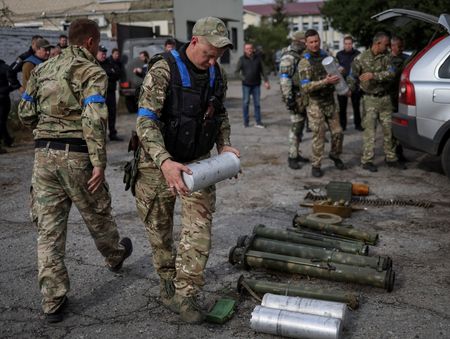By Anne Kauranen
HELSINKI (Reuters) – Finland is considering pulling out of an international agreement banning anti-personnel landmines because of Russia’s use of such weapons in Ukraine, Defence Minister Antti Hakkanen said.
Leaving the 1997 Ottawa Treaty prohibiting the use, stockpiling, production and transfer of anti-personnel landmines would require majority backing by Finland’s parliament.
Quitting the agreement would enable Finland’s military to start stockpiling mines again for the first time since the Nordic country, which is now a member of both NATO and the European Union, signed the treaty in 2012.
“I have commissioned an evaluation of whether the use of anti-personnel mines is a strengthening factor for Finland’s defence and whether we should have the ability to use them. And this is from a defensive premise,” Hakkanen told Reuters in a telephone interview.
Finland destroyed more than 1 million landmines after becoming the last EU state to sign the treaty, ratified or acceded to by more than 160 countries but not by Russia.
Finland, which shares a 1,300-km (800-mile) border with Russia, joined the NATO military alliance last year in a policy shift triggered by the war in Ukraine, drawing a threat from Moscow of “counter-measures”.
Anti-personnel landmines are designed to be hidden in the ground and to detonate automatically when someone steps on them or in their proximity.
Such mines kill or maim combatants and civilians alike and often lie buried long after conflicts have ended, posing a lingering danger to civilians.
Hakkanen said Russia was actively using landmines in its war against Ukraine and that therefore Finland, too, needed to re-evaluate their importance for its defence.
“We have examined very closely through intelligence how Russia operates in Ukraine, specifically their mass use of infantry and also their mass use of mines,” Hakkanen said. “This infantry issue is one thing that argued for the fact that it’s worth examining the use of anti-personnel mines.”
Russia did not immediately comment on Hakkanen’s remarks.
PUBLIC PRESSURE
After destroying its anti-personnel mine stocks, Finland developed an alternative deterrent, a remotely-detonated “bounding mine” that springs into the air and fires projectiles at its target when triggered.
Public pressure on the government over Finland being a party to the Ottawa Treaty has mounted since Russia’s 2022 invasion of Ukraine, and increased more last month after the commander of Finland’s defence forces, Janne Jaakkola, told Finnish channel MTV that the topic should be discussed again.
A civic initiative, or petition, was handed to parliament on Wednesday calling for Finland to quit the treaty after it was signed by more than 51,000 people.
Russia has never joined the Ottawa treaty or given up the use of landmines, but Ukraine is a signatory. The United States is the only NATO member state that is not a party to the treaty.
In June 2022, soon after Russia began its full-scale invasion of Ukraine, the U.S. said it would limit its use of anti-personnel landmines, condemning their “irresponsible” use by Russia in Ukraine.
Last month, U.S. President Joe Biden approved the provision of anti-personnel landmines to Ukraine. U.S. Secretary of Defense Lloyd Austin said the decision followed a change of Russia’s tactics in Ukraine to lead with “dismounted forces” instead of mechanised troops.
(Reporting by Anne Kauranen in Helsinki, editing by Terje Solsvik and Timothy Heritage)











